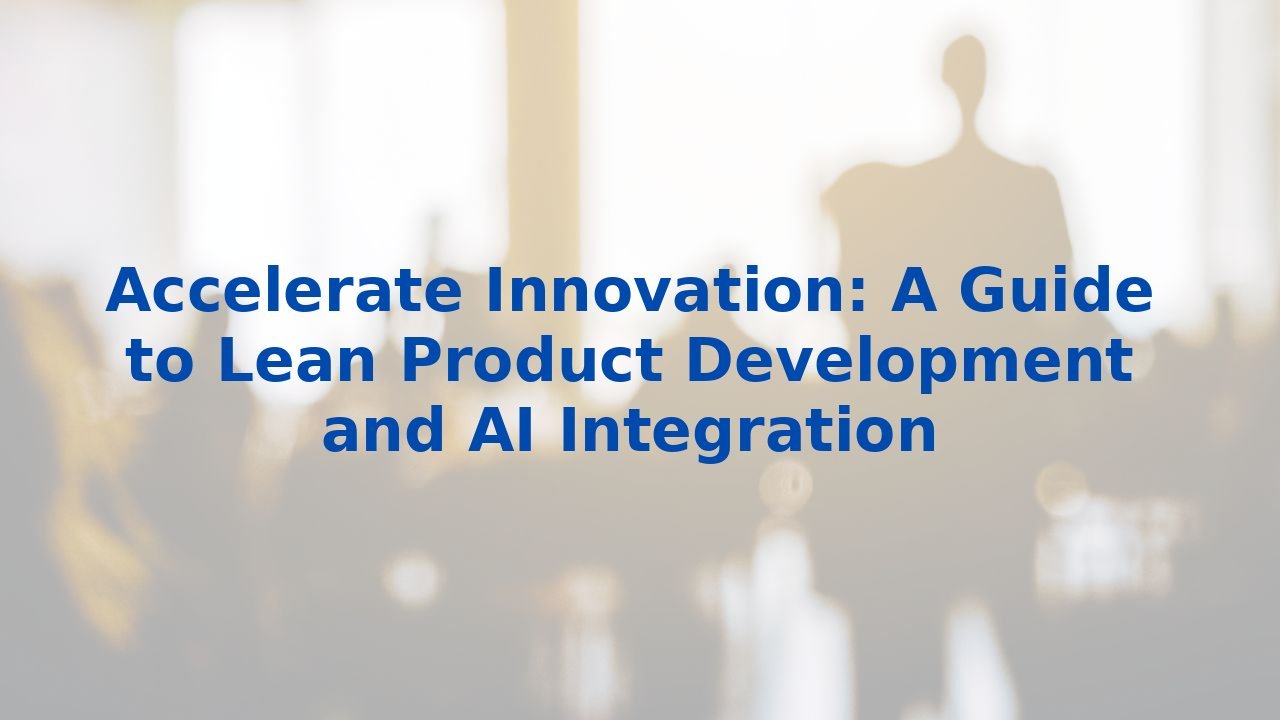Accelerate Innovation: A Guide to Lean Product Development and AI Integration
Accelerate Innovation: A Guide to Lean Product Development and AI Integration
In the fast-paced business landscape of today, companies are under constant pressure to innovate while maintaining efficiency. The intersection of Lean Product Development techniques and Artificial Intelligence (AI) presents a transformative opportunity to fulfill these dual needs. This guide explores how integrating AI into your business processes can not only enhance efficiency but also inspire a culture of continuous innovation.
The Role of Lean Product Development
Lean Product Development focuses on delivering value to customers while minimizing waste. At its core, it encourages teams to continuously assess their processes, eliminate redundancies, and focus on activities that directly contribute to customer value. By fostering a mindset of iterative improvement, organizations can reduce time-to-market and better align products with customer needs.
AI as a Catalyst for Efficiency
Artificial Intelligence offers unparalleled capabilities to streamline and optimize business processes. Here’s how AI can enhance your Lean Product Development efforts:
1. Automation and Operational Efficiency
Incorporating AI into routine tasks allows organizations to automate repetitive processes such as data entry, scheduling, and reporting. By employing AI-driven tools, teams can significantly reduce human error and free up valuable time, empowering employees to engage in more strategic, high-impact initiatives. When daily operations are streamlined, the entire development team can remain focused on innovation.
2. Advanced Data Analytics for Informed Decisions
The capability of AI to process and analyze vast amounts of data in real time transforms decision-making. With machine learning algorithms and natural language processing, businesses can extract actionable insights from consumer behavior, market trends, and operational metrics. This predictive power allows for better resource allocation, helping teams make informed decisions that drive both efficiency and innovation.
3. Enhanced Customer Experience Personalization
Customer-centricity remains paramount in product development. AI enhances this focus by analyzing historical data to tailor experiences for individual users. By understanding purchasing patterns and preferences, businesses can deliver personalized product recommendations and marketing messages, fostering higher customer satisfaction and loyalty. In a world where consumers crave relevance, personalized interactions can be your competitive edge.
4. Strengthened Security Against Threats
As companies adopt more AI technologies, ensuring data security becomes critical. AI enables businesses to detect cyber threats rapidly, analyze anomalous behavior, and implement preventative measures. By automating security protocols, organizations can not only protect their data but also build trust with customers, laying a strong foundation for brand loyalty and market stability.
Driving Innovation with AI
AI doesn't just optimize existing processes; it also drives innovation in product development.
Accelerating the Development Cycle
With AI’s ability to predict market trends and consumer needs, product development cycles can become more agile. By leveraging predictive analytics, teams can identify opportunities early, develop prototypes faster, and iterate based on real-time feedback. Companies that embrace AI as a companion in their development journey are better positioned to capitalize on emerging trends and pivot swiftly to meet market demands.
Fostering a Culture of Continuous Improvement
AI can also uncover insights that encourage teams to experiment and iterate more freely. When organizations adopt a mindset that embraces iterative cycles fueled by AI-derived insights, they cultivate a culture where innovation thrives. Employees feel empowered to explore new ideas, knowing they have data-backed support for their initiatives.
The Importance of Training for AI Integration
The transformative potential of AI can only be realized through effective training. As organizations adopt these powerful tools, it is crucial that employees are equipped with the skills and knowledge needed to utilize AI effectively. Tailored training programs that focus on enhancing AI literacy will not only increase productivity but will also instill a sense of ownership among team members.
Training helps employees understand how to integrate AI tools into their workflows and interpret the insights generated. When your workforce is empowered with artificial intelligence competencies, the organization remains agile and competitive in the marketplace.
Conclusion
Integrating AI into Lean Product Development is no longer optional; it is a pathway to staying competitive in today’s dynamic environment. By leveraging AI for automation, data analytics, personalized customer experiences, and enhanced security, organizations can accelerate innovation while driving efficiencies. Equally important is the investment in training employees to navigate this AI-driven landscape effectively. In doing so, businesses not only optimize their operations but also create a culture where continuous improvement is at the heart of their ethos.
In a world defined by rapid change, the synergy between Lean methodologies and AI represents a powerful movement towards proactive innovation. Embrace this opportunity, and watch as your organization transforms.



